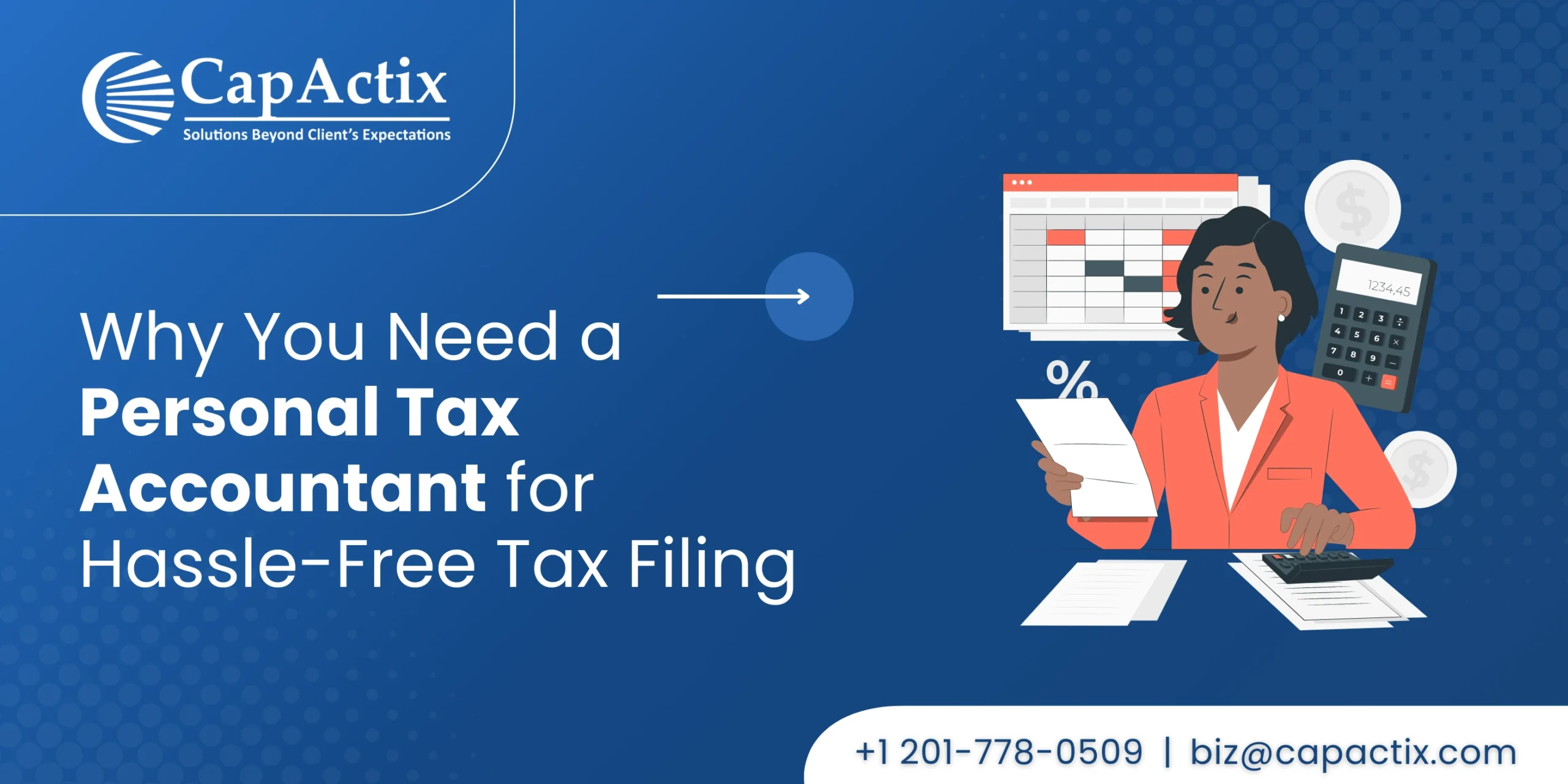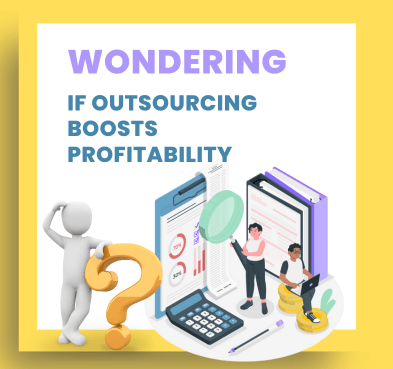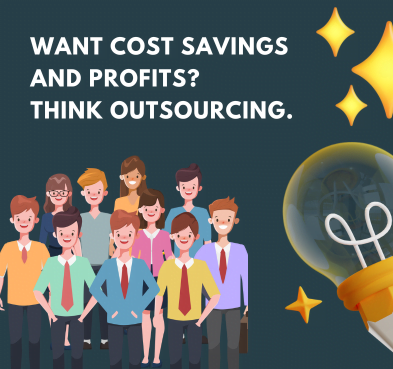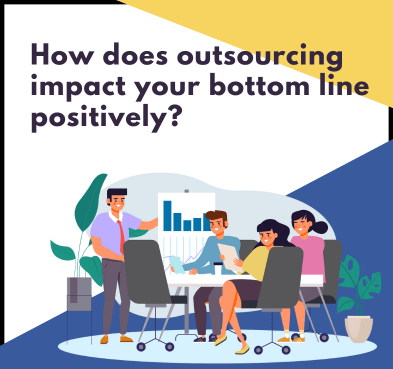Tax filing is much like running a maze without the best personal tax accountant. Certainly, it is complicated, time-consuming, and full of potential traps. Many taxpayers have problems understanding the constantly evolving tax regulations, identifying allowable deductions, and ensuring compliance with IRS policies. One mistake can lead to delays, fines, or even an audit.
Even with computer tax programs, the do-it-yourself approach generally falls short, especially for those with more than one source of income, investments, or self-employment income. While such programs can help with basic arithmetic, they fail to succeed in giving individual advice, tax planning, or maximizing every deduction to its highest value. In this regard, the services of a personal tax accountant are particularly valuable to you.
When hiring a personal tax accountant, it isn’t just filling out returns; they provide guidance all year round, maximize tax-saving opportunities, and help individuals make smart financial choices. Whether a freelancer, small business owner, or an individual with complicated financial assets, having an expert fill out one’s taxes ensures accuracy, peace of mind, and long-term financial savings.
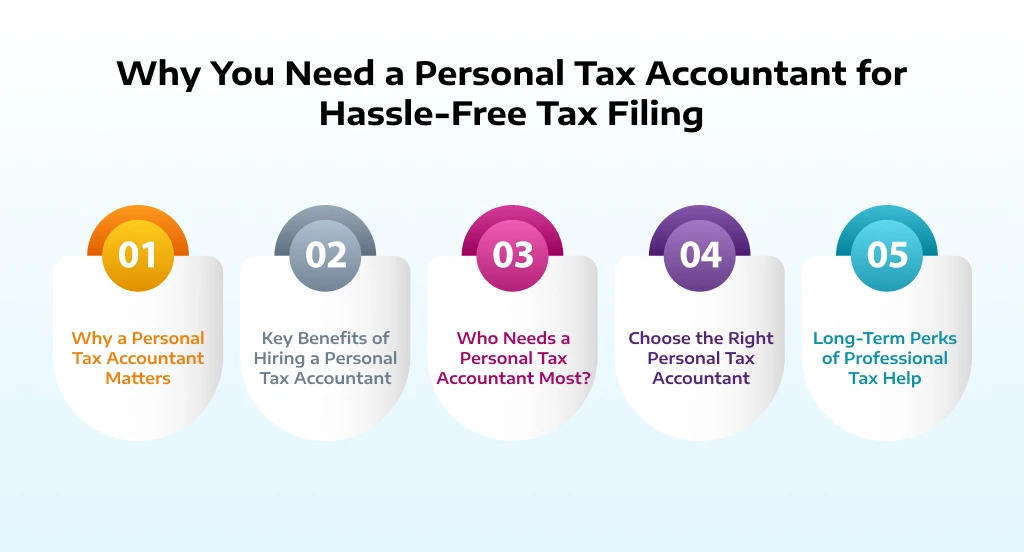
1. The Personal Tax Accountant’s Role and Why It Matters
Everyone thinks that the role of a tax accountant is just to do annual returns; however, their skill set is far more than this activity. A personal tax accountant reviews your financial condition, evaluates you for tax compliance with tax law, and determines how to minimize your taxable income legally.
How Best Personal Tax Accountant Facilitate Tax Simplification
Tax codes are constantly changing, and this is a challenge for the typical taxpayer to stay up to date with the latest changes. A personal tax accountant near me is up to date on federal, state, and local laws, thus ensuring that your returns are accurate and that you don’t miss out on new credits or deductions. Their attention to detail prevents common mistakes that can result in an audit or cost you money.
Furthermore, when you are hiring a personal tax accountant, he will give you organized financial planning that is ahead of the tax season limitations. They analyze your sources of income, investments, and spending to create tax strategies with the potential to save you money not only for a single year, but for numerous years in the future. This planning forward approach is particularly useful for individuals who anticipate their income fluctuating, who have rental properties, or who receive stock dividends.
The Gap Between Professional Service and Do-It-Yourself Tax Preparation
Although tax software is able to quickly produce returns, it does not consider some nuances such as state taxation laws, sophisticated deductions, or overall tax planning techniques. Most taxpayers do not realize it, but they overpay because they do not know the full range of deductions to which they are eligible. A personal tax accountant, however, tailors the filing process to your financial picture and makes sure that you leave no money behind.
In addition to calculations, professionals also provide advice on estimated tax payments, investment tax effects, and retirement contributions. This kind of information simply can’t be provided by self-service tax software.
2. The Most Important Advantages of Employing the Best Personal Tax Accountant
Guaranteeing Precision & Compliance
Tax regulations are intricate, and errors are expensive. The IRS approximates that 21% of paper-filed returns have errors, frequently resulting in delayed refunds or surprise tax liabilities. A personal tax accountant avoids these risks by double-verifying each aspect, confirming that calculations are accurate, and ensuring that deductions are compliant with legislative criteria.
In addition to accuracy, a tax professional assists you in compliance with federal and state tax laws. Staying in compliance is especially vital for self-employed individuals, small business owners, and foreign investment holders since underreporting income or deductions can lead to audits and penalties.
Maximizing Deductions & Tax Credits
Most taxpayers forgo beneficial deductions and tax credits because they are unaware of their existence. When you consider a personal tax accountant near me, you can be assured that he meticulously analyzes your financial history in order to find each allowable tax-saving avenue. Whether it’s business expenses, medical bills, education credits, or investment losses, they make certain you benefit from all that you qualify.
For homeowners, contributors to retirement plans, or stock investors, tax codes can be extremely helpful, if done properly. A tax professional will help you claim every deduction while remaining in good standing with the IRS.
Also Read: Ultimate Guide for Business Tax Preparation: Must Know Deductions and Credits
Saving Time and Reducing Stress
Preparing taxes can take you hours, sometimes days, depending on how many sources of income you have or how complicated your deductions are. According to the IRS, tax preparation takes the average taxpayer 13 hours. By paying a professional, you get to save precious time that could be spent on work, family, or other priorities.
The best personal tax accountant takes care of all tax filing from getting financial documents to filing on time. This implies no last-minute scramble, no wondering if forms were filled out correctly, and no worry about making mistakes.
3. Who Stands to Gain Most by Employing a Personal Tax Accountant?
While others with basic tax returns can do without a professional, the majority of individuals stand to gain a lot from employing an accountant.
Freelancers & Self-Employed Professionals
Independent contractors do not have taxes withheld from their pay, so quarterly estimated tax payments are essential. If you are hiring a personal tax accountant who is a self-employed individual, then he must comply with these requirements while having as many deductions as possible for home office expenses, business travel, and equipment purchases.
Small Business Owners
Business owners handle payroll taxes, business expenses, and operating cost-related deductions. Tax accountants organize finances in a way that maximizes deductions while complying with business taxation laws.
High Income Earners & Investors
The higher your earnings, the more complex your tax picture is. Investors, property owners, and those who have several streams of income pay capital gains tax, dividend tax, and rental house deductions. The best personal tax accountant serves to limit liabilities while optimizing after-tax returns.
4. Selecting the Right Personal Tax Accountant
Not everyone providing tax accountancy services has the same standard of expertise. Here’s what to do in order to choose the personal tax accountant near me for your requirements:
Check Credentials & Experience
Obtain professionals certified as CPA (Certified Public Accountant) or EA (Enrolled Agent). Experience working with personal tax issues for a number of years can make an immense difference to the quality of guidance you’ll be getting.
Read Client Reviews & Testimonials
A strong reputation speaks volumes. Reading reviews and testimonials provides insights into the accountant’s reliability, professionalism, and ability to find tax-saving opportunities.
Understand Pricing & Services
Some accountants charge hourly, while others offer flat fees. Ensure that pricing is transparent and matches the complexity of your tax needs.
5. The Long-Term Value of a Personal Tax Accountant
Year-Round Tax Planning & Financial Strategy
The best personal tax accountant is not only helpful come tax time. They offer year-round advice to assist you in making better financial choices. From structuring investments to retirement planning to business expansion, they are an important part of long-term financial well-being.
Reducing Tax Burden Over Time
Strategic tax planning enables you to capture deductions and credits ahead of tax season even starting. When considering using a personal tax accountant near me, then he assists you in organizing income, prudently claiming deductions ahead of time, and reducing tax burdens in the future.
Also Read: 6 Tricks To Offload The Tax Season Burden of Your CPA/Accounting Firm
Establishing a Trust-Based Financial Relationship
Having a long-term tax accountant is having someone who knows your financial past and future aspirations. In the long run, this can assist you in making better tax and investment choices.
Common Tax Blunders & How a Personal Tax Accountant Prevents Them
Tax filing can be a simple process, but one small error can result in overpayment, penalties, or IRS audits. Most unaware taxpayers make errors that lower their refunds or add tax liability. The best personal tax accountant guarantees that all the details are correct, allowing taxpayers to steer clear of expensive blunders while claiming maximum deductions and credits. The following are some of the most common tax filing mistakes and how a tax professional prevents them.
1. Incorrect or Missing Information on Tax Returns
Common Mistakes:
- Typos in names, Social Security numbers, or bank account details
- Filing under the wrong tax status (Single, Married Filing Jointly, Head of Household, etc.)
- Entering incorrect income amounts or missing income from side jobs
- Forgetting to report 1099 income (freelance earnings, dividends, or stock sales)
How a Personal Tax Accountant Helps:
A tax professional double-checks all the details, confirming all financial and personal information is accurately entered. They check income sources, balance financial statements, and confirm that each dollar of income earned is reported correctly. This minimizes the chances of IRS questions, processing delays, and rejected tax returns.
2. Overlooking Eligible Tax Deductions & Credits
Common Mistakes:
- Not claiming deductions for student loans, home office expenses, or business travel
- Missing out on tax credits like the Earned Income Tax Credit (EITC) or Child Tax Credit
- Failing to deduct eligible medical expenses or charitable donations
How a Personal Tax Accountant Assists:
The best personal tax accountant works through financial documents in depth to discover every available deduction and credit. They make sure that tax-saving chances, including retirement savings, energy-efficient home upgrades, and education credits, are maximized. Their knowledge ensures maximum refunds and reduced tax burdens.
3. Miscalculating Tax Payments & Refunds
Common Mistakes:
- Underpaying estimated taxes (common among freelancers and business owners)
- Miscalculating tax refunds due to incorrect deductions or credits
- Forgetting to include tax withholdings from multiple jobs
How a Personal Tax Accountant Assists
Tax experts employ accurate computation to avoid estimated tax payments from being incorrect, thus preventing IRS penalties. They make tax refund projections so that taxpayers get the right amount without any unexpected modification. This matters especially for individuals with variable incomes or sources of income
FAQs
Yes. A tax accountant locates deductions, credits, and exemptions that pertain to your situation. They organize your income in a way that you get to take advantage of tax-saving options without breaking IRS laws.
Tax software is great for straightforward returns but can’t discern intricate financial scenarios. If you receive more than one income stream, investments, or business income, a personal tax accountant makes sure you don’t overpay or leave money on the table.
No. Although they are useful for high-income earners, they benefit freelancers, small businesspeople, and even salaried workers with tax optimization techniques that software may miss.
Conclusion
A personal tax accountant is not merely a tax preparer, but a financial partner who guides you through complex tax law, uncovers areas of potential savings, and ensures that you remain in compliance with IRS regulations. With their guidance, you can eliminate expensive errors, ensure you are taking advantage of all available deductions, and decrease tax liabilities both today and tomorrow.
Outside of tax season, they also offer strategic financial planning that favors individuals with investments, rental property, business owners, or uneven income levels. Rather than spend endless hours wrestling with tax codes and paperwork, you can outsource responsibility to a pro so you can focus on what is most important to you, growing your wealth, running your business, and building a secure financial future.





